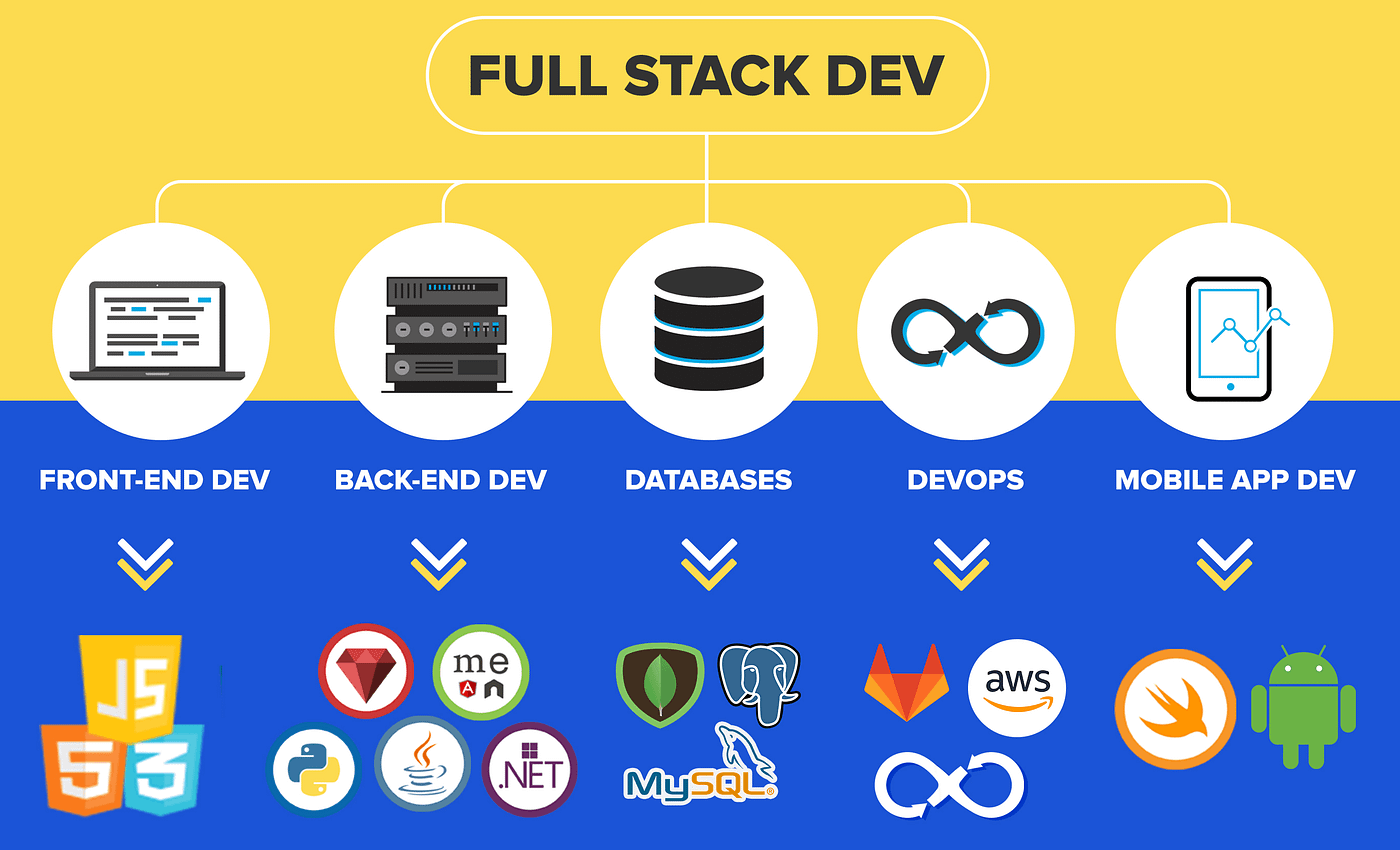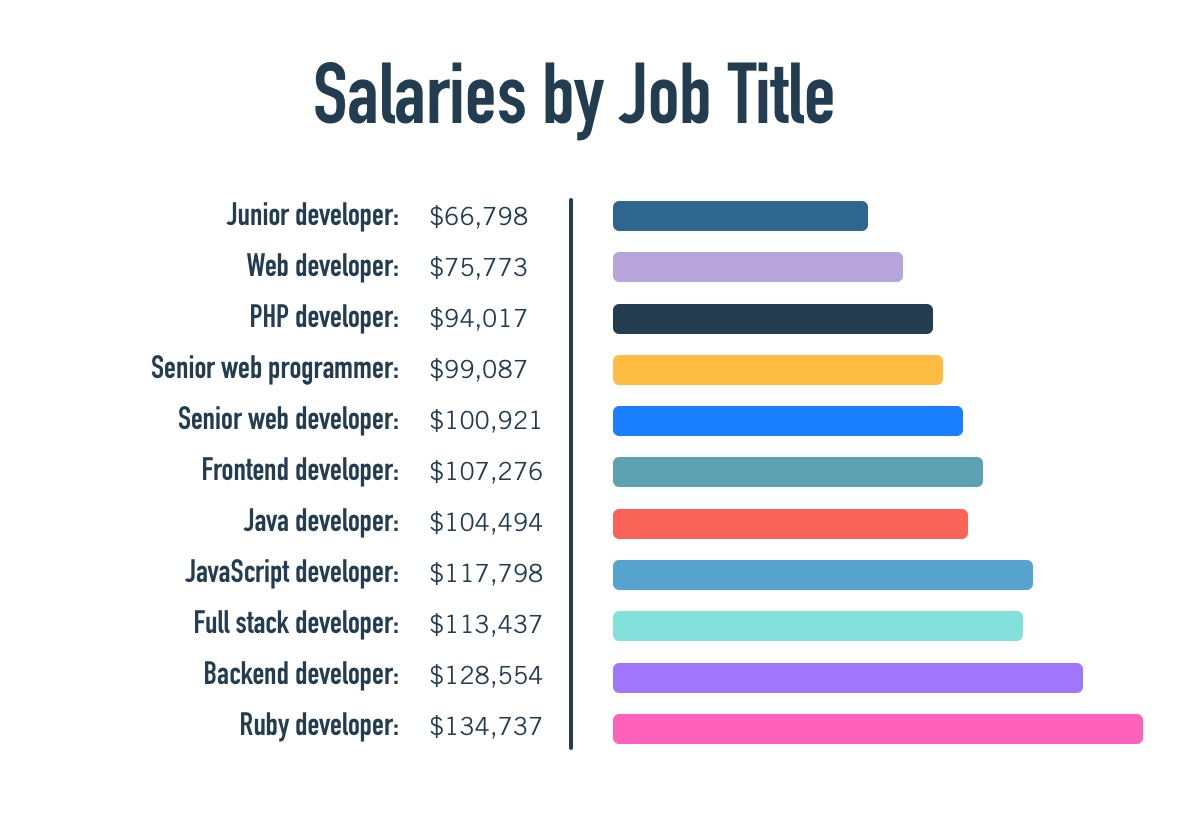In our rapidly evolving digital age, the role of web development has never been more crucial. The internet, with its pervasive influence, has changed the way we interact, work, and consume information. This transformation has created a thriving career landscape in web development, making it an attractive and dynamic field for aspiring professionals.
The Digital Age and Its Impact on Industries
The Digital Age, characterized by the widespread adoption of digital technologies, has revolutionized various industries. From the way we shop to how we connect with others, the digital era has left no aspect of our lives untouched. In this context, web development stands as a pillar of this transformation. It drives the creation and maintenance of websites, the virtual storefronts and information hubs of the modern world.
The impact of the Digital Age can be seen in various industries:
E-commerce
The e-commerce sector has experienced explosive growth, with consumers embracing online shopping. As a result, businesses require robust and visually appealing websites to compete effectively.
Education
In the educational sector, online learning platforms and institutions have proliferated, emphasizing the need for well-designed websites to provide accessible and engaging learning experiences.
Healthcare
The healthcare industry has embraced telemedicine, making healthcare services more accessible through websites and applications.
Entertainment
From streaming services to gaming platforms, the entertainment industry relies on web development to deliver content to users.
Why Web Development Matters in This Context
Web development is the backbone of the digital landscape. It involves creating and maintaining websites, web applications, and other digital platforms. Here's why it matters:
Web Accessibility
Web development ensures that information is accessible to all, regardless of disabilities, devices, or internet speeds. This inclusivity is a hallmark of the Digital Age.
User Experience
The user experience, often referred to as UX, is a core focus of web development. Creating user-friendly interfaces, easy navigation, and seamless interactions is essential in the digital era.
Mobile-Friendly Design
Mobile devices are ubiquitous. Web developers must ensure that websites are optimized for mobile, as Google's search algorithm prioritizes mobile-first indexing.
Career Opportunities
The growing reliance on the internet has created a high demand for skilled web developers. The career opportunities in this field are vast and diverse.
Key Trends in the Web Development Industry
To succeed in a web development career, it's crucial to stay updated with industry trends. Here are some key trends in the modern web development landscape:
Continuous Evolution of Web Technologies
Web development is a dynamic field. Technologies evolve rapidly, and developers must stay current with the latest languages, frameworks, and tools.
Shifting User Expectations
Users today expect faster load times, smooth navigation, and engaging content. Meeting these expectations is a top priority.
The Importance of Mobile Accessibility
With the increasing use of smartphones, mobile-friendly design and responsive web development have become vital.
The modern web development landscape is a dynamic and exciting space. In the following sections, we'll delve deeper into web development careers, the skills you need, and the tools that empower developers to create stunning online experiences.
Understanding Web Development Careers
What is Web Development in the Digital Age?
In the digital age, web development is the process of building and maintaining websites and web applications. It encompasses a range of tasks, from designing the layout and user interface to coding the back-end functionality. Web development can be categorized into:
- Front-end Development: This involves the visible elements of a website that users interact with, such as buttons, menus, and content presentation.
- Back-end Development: This focuses on the server-side functionality, databases, and application logic that power a website.
- Full-Stack Development: Full-stack developers are proficient in both front-end and back-end development, allowing them to work on the entire web development process.

Career Opportunities in Web Development
The Growing Demand for Web Developers
The demand for web developers is on the rise, and this trend is expected to continue. The internet has become a primary platform for communication, commerce, and information access. As a result, businesses and organizations require professional web developers to create and maintain their online presence.
Skills Required for Web Development Careers
Web development is a multidisciplinary field, and as such, it demands a range of skills:
- Programming Languages: Understanding languages like JavaScript, Python, and HTML/CSS is fundamental for web developers. These languages enable developers to create interactive web pages, design layouts, and manage content.
- Web Development Frameworks: Frameworks like React, Angular, and Vue.js simplify the development process by providing pre-built components and tools.
Front-end, Back-end, and Full-Stack Development
Front-end Development
Front-end developers focus on creating the visual elements of a website that users see and interact with. Their tasks include:
- Designing responsive and user-friendly web pages.
- Implementing interactive features using JavaScript.
- Ensuring compatibility across various browsers and devices.
Back-end Development
Back-end developers work behind the scenes to ensure that websites function correctly. They manage databases, server configuration, and application logic. Key responsibilities include:
- Server management and optimization.
- Database design and administration.
- Handling user authentication and security.
Full-Stack Development
Full-stack developers have expertise in both front-end and back-end development. This versatility allows them to work on the entire web development process, from the user interface to server-side functionality.
Web Development in the Modern Landscape
Web Development Tools and Technologies
Modern web development relies on a variety of tools and technologies to streamline the development process. Here are some essential ones:
| Tool/Technology | Purpose |
|---|---|
| Integrated Development Environments (IDEs) | Code writing, debugging, and project management. |
| Version Control Systems (e.g., Git) | Tracking and managing code changes and collaboration. |
| Content Management Systems (e.g., WordPress) | Simplifying content updates and website management. |
Responsive Web Design
With the proliferation of mobile devices, responsive web design has become a standard practice. Responsive design ensures that websites adapt to different screen sizes, offering a seamless user experience.
Mobile-First Development
Considering the prevalence of smartphones, web developers increasingly adopt a mobile-first approach, designing websites and applications with mobile users as the primary audience.
In the next sections, we'll explore the web developer's toolkit, including programming languages, web development frameworks, and the intersection of web development and user experience.
The Web Developer's Toolkit
Programming Languages in Web Development
JavaScript, Python, and More
Web development relies on a diverse set of programming languages, each serving a specific purpose:
- JavaScript: It's the primary language for web development, enabling dynamic and interactive web pages.
- Python: Known for its readability and versatility, Python is used for various web applications and data manipulation.
- HTML and CSS: Although not traditional programming languages, HTML and CSS are fundamental for structuring web content and styling.
The Role of HTML and CSS
HTML (HyperText Markup Language) is used for structuring the content of web pages, defining headings, paragraphs, links, and images. CSS (Cascading Style Sheets) complements HTML by specifying the visual layout, colors, and typography.
Exploring Web Development Frameworks
Comparing Popular Frameworks
Web development frameworks provide pre-built components and tools, simplifying the development process. Some popular frameworks include:
- React: Known for building dynamic user interfaces with reusable components.
- Angular: Developed by Google, Angular offers a comprehensive set of tools for front-end development.
- Vue.js: A progressive framework for building user interfaces, combining flexibility and simplicity.
Web Development and User Experience
The Intersection of UX and Web Development
User Experience (UX) is a critical aspect of web development. It involves creating an enjoyable and efficient experience for website visitors.
Creating User-Friendly Websites
Navigation, accessibility, and performance are key aspects of user-friendly websites:
- Navigation: Easy and intuitive navigation ensures that users can find what they need without frustration.
- Accessibility: Web developers should ensure that websites are accessible to all, including those with disabilities.
- Performance: Faster load times and smooth interactions contribute to a positive user experience.
UX/UI Design in Web Development
The collaboration between web developers and User Interface (UI) designers is essential for creating visually appealing and functional websites. Design considerations include:
- Balancing aesthetics with functionality to create an attractive and user-friendly interface.
In the next sections, we'll navigate the web development career path, providing insights into becoming a successful web developer, the job market, and the differences between freelancing and full-time positions.
Navigating the Web Development Career Path
Becoming a Successful Web Developer
The Education and Training You Need
Becoming a web developer doesn't always require a traditional computer science degree. Various educational paths can lead to success, including:
- Degrees: Pursuing a Bachelor's or Master's degree in Computer Science or a related field can provide a strong foundation.
- Bootcamps: Coding bootcamps offer intensive, short-term training focused on practical web development skills.
- Online Learning Resources: Numerous online courses and tutorials can help you learn web development at your own pace.
Building Your Web Developer Portfolio
A robust portfolio showcases your skills and work to potential employers and clients. Include a variety of projects that demonstrate your capabilities, such as:
- Personal websites or blogs.
- Web applications or interactive projects.
- Contributions to open-source projects.
Landing Your First Web Development Job
Crafting a resume and preparing for interviews are crucial steps in securing your first web development position. Focus on:
- Resume: Highlight your skills, experiences, and projects. Tailor your resume to match the job you're applying for.
- Cover Letter: Write a compelling cover letter that explains your passion for web development and why you're the right fit for the role.
Web Development Job Market
Current Employment Trends
The job market for web developers is dynamic, with several notable trends:
- Remote Work Opportunities: The COVID-19 pandemic has accelerated the adoption of remote work, making it more common in the web development field.
- Job Growth in Emerging Markets: As businesses and individuals worldwide create an online presence, job opportunities for web developers continue to expand.
 Salaries and Benefits
Salaries and Benefits
Web developers typically enjoy competitive salaries and benefits. However, these figures can vary based on factors such as:
- Geographic location: Salaries in major tech hubs may be higher compared to smaller cities.
- Experience and skills: Experienced developers often command higher salaries.
- Type of employer: Tech companies may offer different compensation packages than non-profits or government agencies.
Freelancing vs. Full-Time Positions
Web developers have the flexibility to choose between freelancing and full-time employment:
- Freelancing: Freelancers enjoy autonomy, setting their own schedules and choosing their clients. They often work on a project basis.
- Full-Time Positions: Full-time employees receive a stable income, benefits, and job security. They work on projects for a single employer or company.
In the following sections, we'll explore key trends in modern web development and discuss the value of web development certifications for career growth.
Staying Ahead in Your Web Development Career
Key Trends in Modern Web Development
Continuous Evolution of Web Technologies
Web development is an ever-evolving field, and staying current with the latest technologies is crucial. Notable trends include:
- Artificial Intelligence and Machine Learning in Web Development: AI and ML are being used to automate tasks, personalize user experiences, and enhance website functionality.
- Voice Search and SEO in Web Development: Voice search is on the rise, and web developers need to optimize websites for voice queries to remain competitive.
- The Future of Web Development: As technology advances, web development will continue to evolve, with emerging trends and innovations shaping the digital landscape.
Web Development Certifications for Career Growth
The Value of Certifications
Certifications validate your skills and expertise, demonstrating your commitment to professional development. They offer several advantages:
- Industry Recognition: Well-known certifications are recognized by employers and can set you apart from other candidates.
- Skill Validation: Certifications validate your knowledge in specific areas, such as front-end development, back-end development, or web security.
- Career Advancement: Earning certifications can lead to career advancement and increased earning potential.
Top Web Development Certificates
Consider pursuing certifications in specialized areas, such as:
- Certified Web Developer (CWD): This comprehensive certification covers web development fundamentals, front-end and back-end development, and responsive design.
- Google Mobile Web Specialist: Focusing on mobile web development, this certification is valuable for those aiming to excel in the mobile-first landscape.
- AWS Certified Developer - Associate: If you're interested in cloud-based development, this certification demonstrates your skills in using Amazon Web Services for web development.
How to Obtain and Showcase Certificates
The process of obtaining certifications typically involves:
- Selecting a Certification: Choose a certification that aligns with your career goals and interests.
- Preparation: Invest time in studying and preparing for the certification exam.
- Taking the Exam: Register for and complete the certification exam.
- Adding Certifications to Your Resume: Include your certifications in your resume, emphasizing your newly acquired skills.
- Promoting Your Expertise: Share your certifications on LinkedIn and professional networks to gain visibility and recognition.
In the following sections, we'll explore a day in the life of a web developer, the challenges and rewards of the profession, and offer tips for aspiring web developers.
A Day in the Life of a Web Developer
Daily Responsibilities
A web developer's day typically includes a variety of responsibilities:
- Coding, Testing, and Debugging: Writing and modifying code, testing applications, and debugging issues are core tasks.
- Collaborating with Designers and Clients: Web developers often collaborate with UI/UX designers to bring designs to life and work closely with clients to understand project requirements.
- Project Management: Organizing tasks, managing deadlines, and ensuring projects progress smoothly.
Challenges and Rewards
Challenges of Web Development
Web development is not without its challenges:
- Troubleshooting Technical Issues: Debugging can be time-consuming and challenging when dealing with complex code.
- Creative Problem Solving: Creating unique and innovative solutions is both a challenge and an opportunity for growth.
Rewards of Web Development
The field also offers numerous rewards:
- Continuous Learning: The dynamic nature of web development means you're always learning and improving your skills.
- Creativity and Innovation: Building interactive websites allows you to express your creativity and innovate.
- High Demand: The high demand for web developers translates to competitive salaries and job security.
Tips for Aspiring Web Developers
If you aspire to become a successful web developer, consider the following tips:
- Networking and Building Professional Relationships: Connect with other developers, attend web development meetups, and engage in online communities. Networking can lead to job opportunities and collaborations.
- Continuous Learning and Skill Development: Stay updated with the latest web development trends, tools, and techniques. Invest time in expanding your skillset.
- Building a Personal Brand: Create an online presence by maintaining a portfolio website, writing blog posts, and showcasing your work. A strong online presence can attract clients and employers.
Conclusion
In conclusion, web development plays a pivotal role in the Digital Age, shaping the way we interact with information, services, and products. The field offers abundant career opportunities, and with the right skills and knowledge, you can build a rewarding career as a web developer.
Final Thoughts
As the digital era continues to unfold, web development remains a dynamic and ever-changing field. Embrace the opportunities it presents, and take the next steps in your web development journey with confidence. Your future as a successful web developer is full of exciting possibilities.
By following the trends, obtaining relevant certifications, and nurturing your skills, you can thrive in the digital age as a web development professional. With your commitment and dedication, the digital landscape is your canvas, ready for you to create innovative and impactful online experiences.

